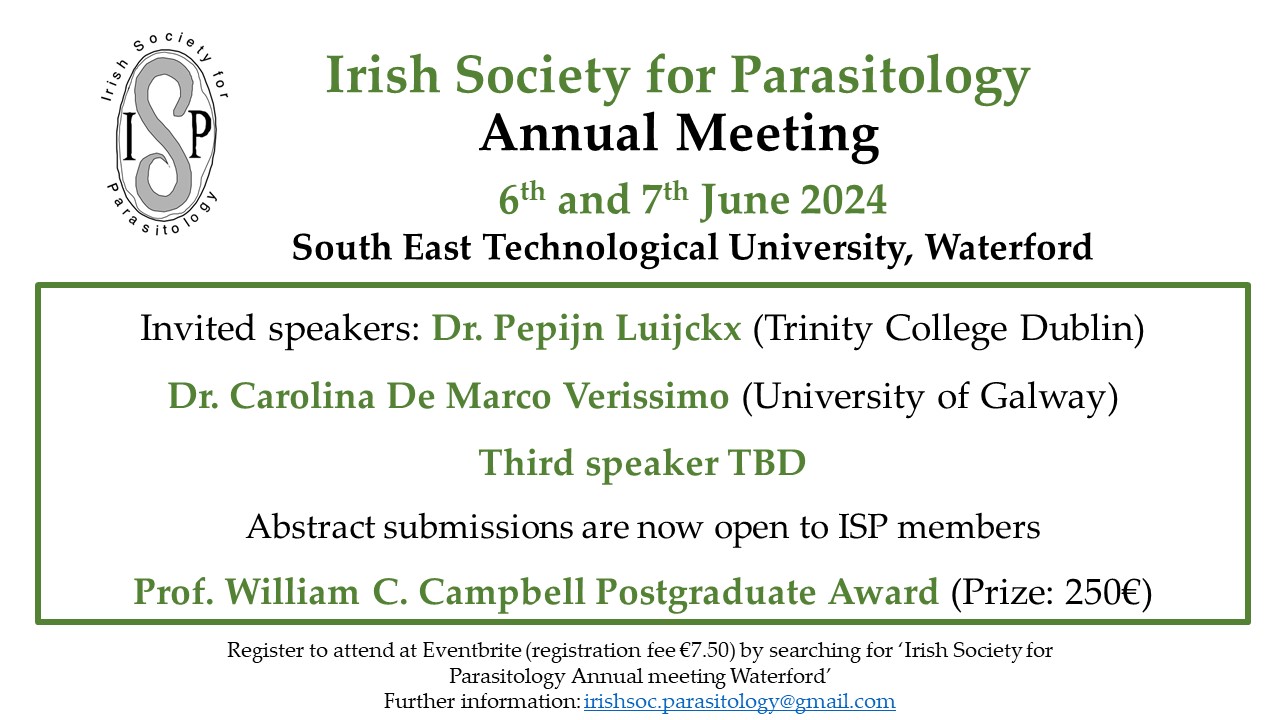The next ISP annual meeting will be held in the South East Technological University in June 2024
Register now.
Submit abstracts via the abstract submission form.

The next ISP annual meeting will be held in the South East Technological University in June 2024
Register now.
Submit abstracts via the abstract submission form.

2023
The 2023 Annual Meeting of the Irish Society for Parasitology was held at Munster Technological University in Tralee.
Guest speakers joined from Canada, Belfast and Belgium: Derek McKay, Rebecca Armstrong and Maarten Vanhove. Interesting results of a wide range of parasite research projects were shared by early career, postgraduate and undergraduate researchers over the two-day event. A very successful Parasitology for the People event in Benners Hotel brought together local farmers and parasite researchers for a discussion of parasite management in agriculture.
2022
The 2022 Annual Meeting of the Irish Society for Parasitology was held in National University of Ireland Galway.
A hybrid event with 61 registered in person attendees and 22 virtual attendees, it was the first conference attended by many of the PhD students and they had a great experience. The Keynote speaker who presented virtually was Prof Conor Caffrey from Skaggs School of Pharmacy UC San Diego who presented a talk entitled " The schistosome parasite: developing tools to aid drug discovery" . The plenary speakers were Dr Nikki Walshe from University College Dublin Veterinary School whos talk entitled " From equine vet to wannabe parasitologist. An indirect lifecycle" was received with great interest from the audience and Dr Hannah Vineer from the University of Liverpool who delivered a talk on the second day of the conference entitled " Know your enemy: modelling to inform sustainable parasite control".
Our conference speakers were from University of California, Queen’s University Belfast, University College Dublin, the National Museum of Ireland, Trinity College Dublin, The Swedish Museum of Natural History, Munster Technological University, Kano State Polytechnic Nigeria, National University of Ireland Galway, The University of Bath and The University of Lincoln. A number of travel awards for undergraduate and early career researchers sponsored by the Irish Society for Parasitology were awarded to conference delegates.
2021
Due to the ongoing pandemic situation we moved online for our annual meeting, which took place on March 26th, 2021.
We were delighted to be joined by plenary speaker Professor Elizabeth Innes (Moredun Research Institute, Edinburgh Scotland) who presented a talk titled
Toxoplasma gondii: The world's most successful parasite?
Keynote speakers included Prof Russell Stothard (Liverpool University) and Prof Tom Kelly (University College Cork).
2019
Queen’s University Belfast (QUB), Northern Ireland.
JOHN GILLEARD, University of Calgary, Canada. Benzimidazole resistance in Haemonchus contortus.
The ‘Prof. William C. Campbell Award for PhD Candidates’ sponsored by Cambridge University Press (publishers of Parasitology) was awarded to Paula Tierney, then at Trinity College Dublin.
2018
Palace of the Academies, Brussels, Belgium (held jointly with BSPP, ISP, BAVP & EVPC).
GREG MATLASHEWSKI, McGill University, Canada. CRISPR genome editing in Leishmania.
RICHARD WALL, University of Bristol. Tick and tick-borne diseases in the UK: the lessons from large scale surveillance studies.
GUY HENDRICKX, AviaGIS, Zoersel, Belgium. VecMap: bridging the gap between research and decision making.
JEREMY
SALT, Galvmed, Edinburgh, UK. The
Animal African Trypanosomosis (Tryps) Programme by GalvMed and the Gates
foundation: how do we enable substantial and sustainable solutions for African
farmers?
2016
Trinity College, Dublin
MARK TAYLOR, Liverpool School of Tropical Medicine. Exploiting the symbiosis of Wolbachia and filarial nematodes for new treatments for lymphatic filariasis and onchocerciasis.
2015
Queen’s University, Belfast
PHILIP SKUCE, Moredun Research Institute. Anthelmintic resistance progress?
2014
University College Dublin
Joint meeting of the Irish Society for Parasitology, British Association for Veterinary Parasitology and the European Veterinary Parasitology College. Theme Parasite Vaccines – Are We There Yet? - with seven key-note presentations
JOHN DALTON. Fasciola hepatica vaccines? It’s been a bumpy, winding road with no clear signs!
THEO SCHETTERS. Vaccination against canine babesiosis
DAVID SMITH. Barbervax: potentially a new tool for the control of Barber’s Pole worm of sheep
MARSHALL LIGHTOWLERS. Recombinant anti-parasite vaccines that actually work: anti-cestode vaccines
FIONA TOMLEY. Advances in vaccination strategies for Dermanyssus gallinae
LUIGI GRADONI. Canine Leishmania vaccines: still a long way to go
RON HOKKE. Schistosoma vaccines
2013
Dublin City University, Dublin
PADRAIC FALLON, Trinity College, Dublin. Researching tropical parasitic helminths in Dublin: did you know Ireland is not in the tropics?
MARK
ROBINSON, Queens University, Belfast. Helminth defence
molecules - utility players in the host-parasite interaction
2012
Trinity College, Dublin
ERIC MORGAN,
School of Biological Sciences, Bristol University. Climate
change and parasites: hot air or a damp squib?
2009
Veterinary Research Laboratory, Backweston, Co. Kildare (with the BVA)
SARAH RANDOLPH, Dept of
Zoology, Oxford University. Increasing tick-borne diseases: environmental and socioeconomic
drivers
2008
University College Cork, Cork.
EILEEN HARRIS, Natural History Museum, London. Helminth parasites in stranded cetaceans
2007
Meeting with the British Society for Parasitology, Queens University Belfast
2006
Central Veterinary Research Laboratory, Backweston, Celbridge, Co. Kildare.
NOEL MURPHY, National
University of Ireland, Maynooth, Co. Kildare. Do African
trypanosomes talk to each other?
2005
Ramada Hotel, Belfast (in association with SafeFood)
2004
Central Veterinary Research Laboratory, Abbotstown, Dublin.
ANDY
FORBES, Merial, UK. The effects of parasites on host behaviour
2003
Joint meeting with the British Association of Veterinary Parasitology, York University
2002
Faculty of Veterinary Medicine, Belfield, UCD, Dublin.
BERNARD LOSSON, University of Liège, Belgium. Echinococcus multilocularis in southern Belgium
2001RICHARD TINSLEY, Bristol University. Regulation of parasite infection levels: a case study based on monogeneans
2000
Central Veterinary Research Laboratory, Abbotstown, Dublin.
PAUL DEAR, MRC Molecular Biology, Cambridge. Parasite genomes: don't worry, be happy.